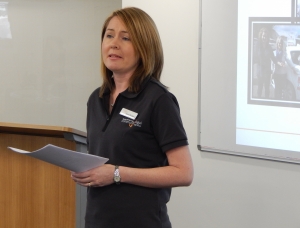HRCLS supports The Justice Project call for stronger focus on legal needs of regional Australians
Hume Riverina Community Legal Service (HRCLS) principal lawyer Sarah Rodgers has welcomed many of the recommendations in the Justice Project Final Report released last week. Ms Rodgers met with representatives from The Justice Project last year during the National Association of Community Legal Centres annual conference to talk about the important issues from a HRCLS perspective.
“We agree with the Justice Project’s vision of no person being denied access to justice in Australia,” Ms Rodgers said. “We fully support the Law Council of Australia continuing to engage with Government and the legal sector to advance the findings from this Report.”

HRCLS principal lawyer Sarah Rodgers
Ms Rodgers said the HRCLS submission to the Report drew attention to a number of issues, including the need for longer-term funding grants, and the impact of large catchment areas on Rural, Regional and Remote community legal centres.
“It was important we highlighted to The Justice Project how the geographic spread and diversity of our Shires means that many people we see are financially and socially disadvantaged” she said.
Another HRCLS recommendation was the need for funding more than one Community Legal Centre (CLC) in each region to address conflict of interest issues would help remove a significant barrier.
“We turnaway about a third of the people who contact us for legal assistance, primarily due to conflicts of interest,” Ms Rodgers said. “Our service continues to see a high level of legal need, and these people have limited options for free legal representation, especially to deal with family law matters.”
As part of the submission to the Final Report, HRCLS also included the Invisible Hurdles project involving NESAY, and the Health Justice partnership with Gateway Health as success stories to highlight how service providers can work together to help people experiencing severe disadvantage.
Key HRCLS recommendations to the Justice Project report
- That lawmakers, policy makers and statutory bodies be required to consider cross border and regional areas when enacting laws and in their implementation.
- Fund more than one CLC in each catchment area.
- Provide incentives to private lawyers to encourage them to provide pro bono assistance to disadvantaged people, including by volunteering their time to their local CLC.
- Provide incentives to encourage lawyers to relocate to the country, such as HELP debt relief, salary packaging or housing subsidies.
- For courts to reconsider online only applications – e.g. divorce applications must now be lodged online. This creates barriers for elderly people, people with literacy issues and those living in rural areas with a lack of internet coverage.
- Fund longer term grants (more than one-two years) to allow sufficient time to establish a project and build relationships of trust.

